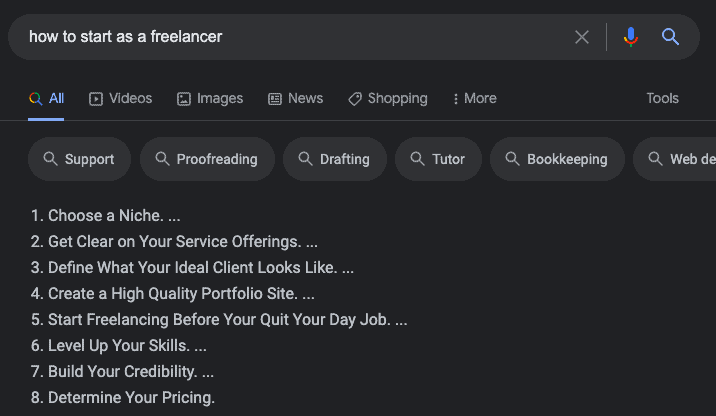Everybody and their mom says you need a freelance website if you want to be a freelancer.
If you have a freelance website then you can make money, right?

Can you become a six figure/year freelancer without a website?
Even the Googles won’t shut up about it.
Excluding the first three things at the top of this search results page (which essentially amount to “have a pulse”), the first action step is to create a high quality portfolio site.

But I’m here to do two things:
- Be a royal pain in your behind by shaking your confidence in that unused Squarespace subscription you’ve been sitting on for the past three months and
- Explain how I became a six figure/year freelancer without a website and how you can too.
If that sounds like a great way to spend the next few minutes, read on, friend.
Your Perceived Need for a Freelance Website Is Holding You Back
Let’s not beat around the bush.
If I had a nickel for every time I heard “I’m going to start freelancing as soon as I build a website!” I would be headed to the nearest Dollar Store right now to buy one of those sticky hand thingamajigs instead of writing this article.
But life isn’t fair so let’s continue.
I believe there are three reasons why beginners and wannabe freelancers think they need a website to get started:
- You feel a little insecure (which is normal; this is new to you after all). Having a website makes you feel like a professional, right? And a domain email on top of that? Ooo la la, fancy pants. Check you out! Yes, professionalism is important, but remember that you can have a domain email without needing to create a website. More on this later.
- Everybody said you need one. We’re not in third grade anymore, but let’s pretend we are for just a second. If everyone said you should eat that old gum stuck underneath the desk in front of you in Ms. Lambers’ class, should you? No! It doesn’t matter what Kelsey says, you don’t need her validation anyways.
- You’re procrastinating. I didn’t want to bust out the P word right when you were starting to feel confident in that domain name your neighbor suggested, but this is the number one reason why I tell new freelancers to get started without a website. It’s so easy to use it as a crutch for the work you should be doing: serving clients.
Each day that passes with you “working on your website” is one more day you’ve spent hiding from the world.
I know the temporary dopamine hit still feels good even after the umpteenth tweak to your About page.
I know you get the satisfaction of crossing “edit my website” off of your to-do list. But dopamine doesn’t pay the bills.
If it did, I would’ve retired long ago as a professional Mario Kart player.
How I Began Thriving Without a Website for Freelancing

Here comes the part where I make myself sound smarter than I am.
I more or less stumbled on the below process, but it paid off big time for me so here it is.
1. I Reframed the Name of the Game
Freelance marketplaces sometimes receive a bad reputation for being a race to the bottom.
I used to believe this storyline too until I learned how to properly leverage them as a strong lead magnet.
In the beginning, I used Upwork and other sites as a way to find quick and dirty “gigs.”
One-off projects that took about a week to complete in exchange for a couple hundred bucks.
But after about five months of this, I realized there was a higher caliber clientele out there. I just wasn’t positioning myself in a way to attract them.
Take these stats for example. According to Upwork’s 2020 Annual Impact Report:
- 85% of their gross sales volume in 2020 was from larger engagements and complex projects.
- 30% of FORTUNE 100 companies are on the platform.
Ready for the kicker?
Despite the volume of “complex projects,” Upwork reports only 50% of their freelancers are classified as “highly skilled.”
I’m no mathlete but that means only half of the people you’re competing with are in the running for 85% of the pie.
I’ll take those odds everyday. Which I happily do.
2. I Studied the Profiles of Other Domain Experts
Once I woke up to the fact that there were some serious contracts to be landed, I did a modified version of market research.
I searched for freelancers on platforms who were ranking for high leverage terms like “strategist,” “consultant,” “senior level,” etc.
Reading their bios and client testimonials on their profiles was enlightening. I settled on three professionals at the top of their game and mixed-and-matched what I liked from each to craft my own compelling profile.
Overnight, I began receiving double the amount of profile views and three times the number of invitations to interview for new projects.
3. I Took It One Step Further by Making a “Pitch Deck”
It’s a requirement for every freelancer on any of the marketplaces to create a profile.
Most just write whatever comes to mind and never look at it again.
So, by taking step two above, you’re already setting yourself up for higher success rates than the average freelancer.
But there’s one more thing you can do to set yourself apart without needing a freelance website: create a pitch deck.
I used the free version of SlideBean to make a beautiful pitch deck in less than 30 minutes.
It’s six pages long, very light on text, and tells a story. You could just as easily use Google Slides or PowerPoint to do this.
But why do this?
Clients Consume Pitch Decks Differently Than They Do a Freelance Website
If we’re being real honest with each other (and, hey, you’re almost to the end of this article, so I think it’s safe for us to start calling each other friends), every freelancer’s website is the same.
We all found the same templates on the same website builders and thought “this is perfect!”
Except the formulaic “About Me” followed by “My Services” followed by “My Clients” isn’t saying anything that your profile on a mass-visited freelance marketplace would.
Plus, clients from the business world are used to reading business-y things.
So a pitch deck highlighting your badassery is not going to turn them off.
In fact, I’ve heard from clients that my pitch deck was more memorable than the generic portfolio sites of others they got bombarded with.
Your Freelance Website Won’t Rank in Google
Because your new website has a snowball’s chance in hell of ranking anywhere remotely meaningful on the Googles (less than 10% of web pages are indexed), the site only exists when you say it does (i.e. you send a direct link to it; which is no different than sending a pitch deck directly, except at least the deck can be opened independent of internet connection or your site’s “load time,” a metric you have no experience or interest in optimizing).
Pitch Decks are Free

A pitch deck is free, fast, easy, and more customizable than an out-of-the-box website.
My sweet spot: right frame of mind + strong profile + pitch deck + a custom email domain
Despite earlier revealing my secret desire to play Mario Kart for a living (shh don’t tell my clients), professionalism is in all seriousness my top core value.
And while there are thousands of freelancers who thrive with a free Gmail address, I do think the small investment in a custom domain email is important.
Here’s why.
The thing about an email address that’s easy to overlook is that your clients will see it every day/week/month for as long as you work together.
If you have a freelance website, the same can’t be said.
I can promise you with 100% assurance that your clients are not bookmarking your site for their daily viewing pleasure, just waiting on that next font update.
So, the email address is actually going to be a more consistent branding tool than a website.
You may as well use it to reinforce the fact that you’re a true professional with every email you send and receive.
Are There Any Other Ways to Start Freelancing?
Yes. There are many paths on the road to success, and the best ones are usually the ones that haven’t been discovered yet.
So, don’t try to duplicate my story or anyone else’s.
Go write your own and then come back and tell us how you did it so we can all make each other better freelancers.
I appreciate you reading these words that came from both my brain and my heart.
If you know of anyone on the fence about freelancing, please consider sending this article to them.
It may be just what they need to hear right now to get them started.



1 Comments